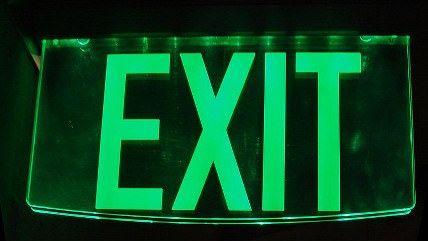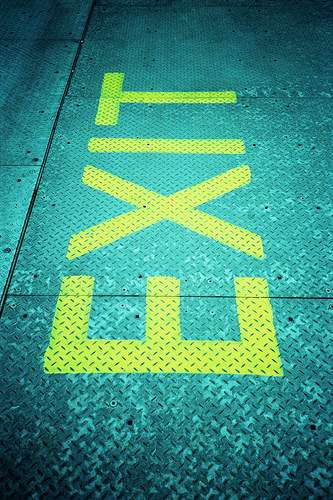Why Not "Opt Out" of Government Control?
From bootlegging to working off the books, we've done it many times before, and it's getting ever-easier to exit the system.


Balaji Srinivasan, a Stanford Universty instructor and genomics entrepreneur, recently offered some radically individualistic advice to aspiring tech innovators. Speaking at at this year's Startup School, sponsored by tech "seed accelerator" Y Combinator, he warned members of the audience that, despite (or maybe, because of) the liberating and enriching qualities of technology in people's lives, the tech industry faces a backlash from old-line power centers. In response, he said, technological innovators should publicly state their case, but also be prepared to exploit a market opportunity to help people escape government control, no matter the law. Their innovations, he suggested, should allows fans of the old order to "enjoy" the rules and structures to which they're attached, but offer the rest of us a means of exiting an increasingly authoritarian system. In other words, to hell with arguing for more freedom, let's take it.
That's good advice for all of us—if we can break with old attitudes and embrace a willingness to defy authority.
"I believe the ability to reduce the importance of decisions made in D.C., in particular, without lobbying or sloganeering, is actually going to become extremely important over the next ten years," Srinivasan told his audience. His goal, one he wants tech entrepreneurs to share, is "giving people the tools to reduce the influence of bad policies over their lives without getting involved in politics; the tools to peacefully opt out."
An opt out from the political system and the burdens it imposes on us is a tempting thought. In many ways, life has never been more tolerant, cooler, safer (for kids and those trying to avoid crime), or richer. It's more possible than ever to work from where you want to live rather than where an office is located, to be gay and safe (if not fully accepted) in ever-more locations, to enjoy cultural tastes from punk music to opera to porn without having to seek rare venues, to communicate with people and access information far and wide. But weighing on all of this like the world's wettest blanket or a Handicapper General of joy is the institution of government, its smothering regulations and intrusive controls over our lives.
In the United States, despite our enormous prosperity and real freedom compared to much of the world, governing institutions have been slipping in their respect for freedom in recent years.
Former Washington Post executive editor Leonard Downie Jr. calls the terrorist attacks of September 11, 2001 a "watershed" that catalyzed explosive growth in the security state and hostility on the part of politicians toward independent scrutiny. Downie authored a scathing 2013 report for the Committee to Protect Journalists, writing, "Journalists and transparency advocates say the White House curbs routine disclosure of information and deploys its own media to evade scrutiny by the press. Aggressive prosecution of leakers of classified information and broad electronic surveillance programs deter government sources from speaking to journalists."
Which is to say, Downie is probably on a couple of lists, right now.
That growing security-state encouraged Internet surveillance, erupting into a scandal this year after Edward Snowden blew the whistle on massive NSA international and domestic spying operations. In response, Freedom House cautioned in Freedom on the Net 2013 that, while the U.S. "has a robust legal framework that supports free expression rights…a series of U.S. government practices, policies, and laws touch on, and in some cases appear to violate, the rights of individuals both inside the U.S. and abroad."
The U.S. has slid on two key measures of Economic Freedom in those same years, too: the Heritage Foundation's Index of Economic Freedom, and the Economic Freedom of the World: 2013 Annual Report (PDF), compiled by Canada's Fraser Institute. Fraser points out:
"Throughout most of period from 1980 to 2000, the United States ranked as the world's third-freest economy, behind Hong Kong and Singapore…By 2005, the US rating had slipped to 8.21 and its ranking fallen to 8th. The slide has continued. The United States placed 16th in 2010 and 19th in 2011."
So, while it really is an interesting and rich world around us, it would be so much better if we could only "peacefully opt out" of the control freak policies imposed from above.
And there are a lot of us who potentially could find the opportunity to opt out very tempting. The 2013 American Values Survey by the Public Religion Research Institute found that seven percent of Americans are "consistent libertarians" and another 15 percent "lean libertarian." Add in others who want to be left alone on a case-by-case basis, and you have tens of millions of Americans who might choose to "reduce the importance of decisions made in D.C." in their own lives. That's a minority of the population, voting-wise, but certainly a big community of support for fellow opt outers who have given up on election results, as well as a market for whatever tools and services Balaji Srinivasan and his friends develop.
But that community can only develop if its potential participants actually opt out of political control in ways great and small. That means embracing not just new technology, but old-fashioned scofflawry—what Herbert Spencer once described as "the right to ignore the state." In 1884, the control freak-tweaking philosopher wrote, "we cannot choose but admit the right of the citizen to adopt a condition of voluntary outlawry. If every man has freedom to do all that he wills, provided he infringes not the equal freedom of any other man, then he is free to drop connection with the state—to relinquish its protection, and to refuse paying toward its support."
Now that so much of the state's "protection" consists of no-knock raids, phone taps, cops boldly going where only the best of friends (if anybody) ought to go, and the gentle cupping of your crotch at the airport, a choice to "relinquish its protection" seems like a mighty fine idea to many of us.
There's not yet a "thanks anyway, but go to hell" checkbox on the 1040 form, though maybe that'll come along in a year or two, but we can opt out on our own. Srinivasan specifically name-checks Bitcoin, 3D printing, telepresence, and other technologies as methods for escaping government control without the state's consent. But those are just tools. The real key is the willingness to live life as you please, without treading on your neighbors' rights and without knuckling under to authoritarian laws or majority preferences.
This is a land of bootlegging, weed-smoking, defiance of gun control, shrinking tax compliance, and even underground restaurants. Given some cool new technology, I have no doubt we're up to the challenge.


Show Comments (53)